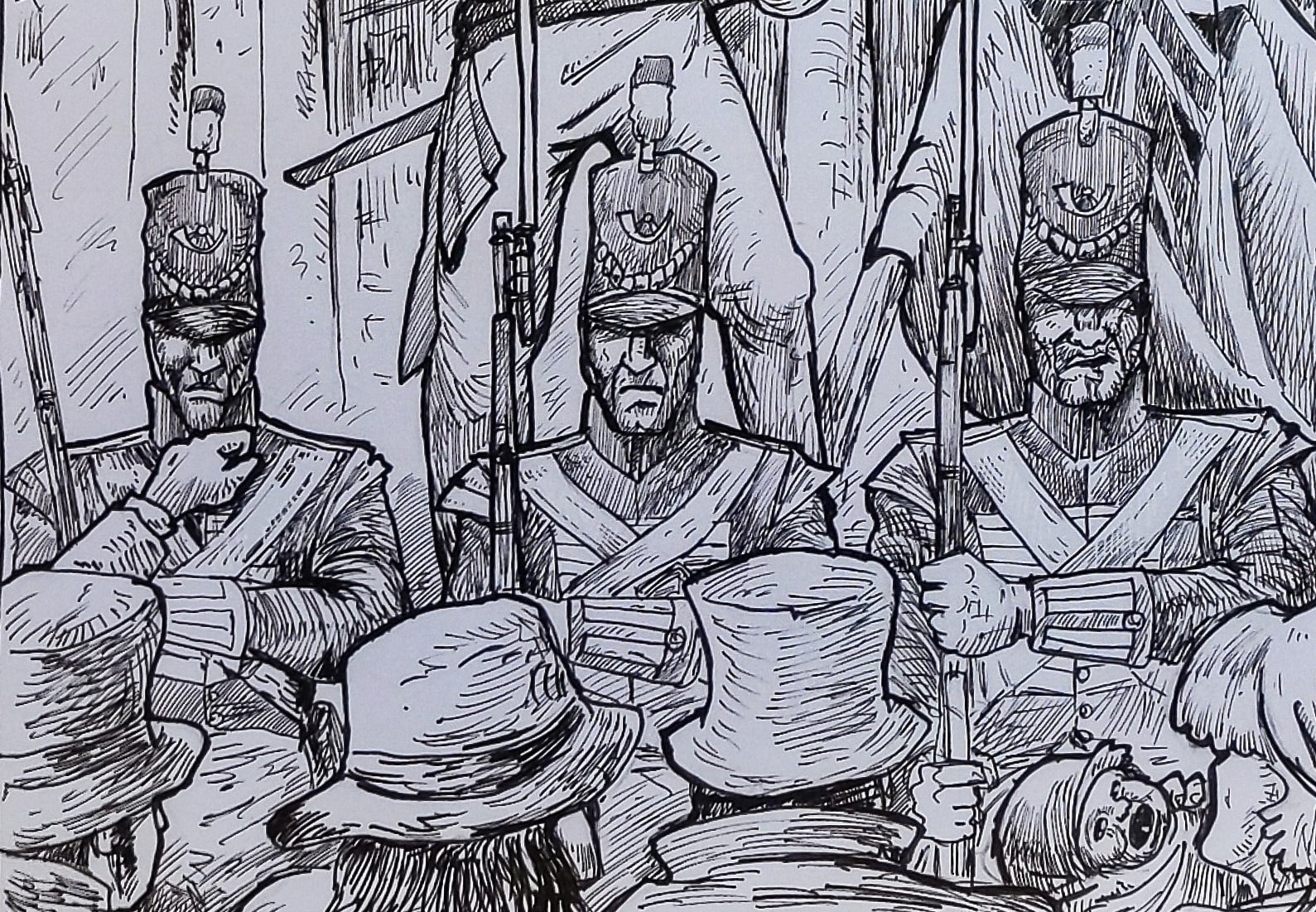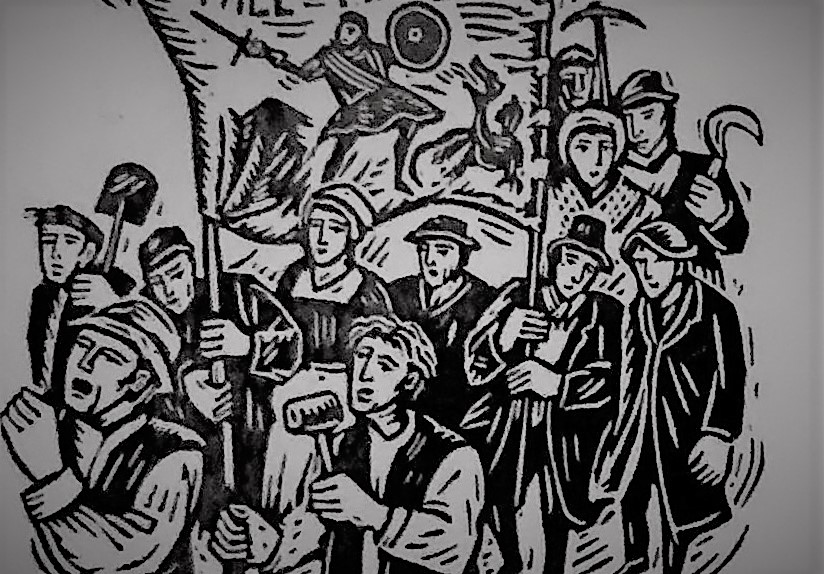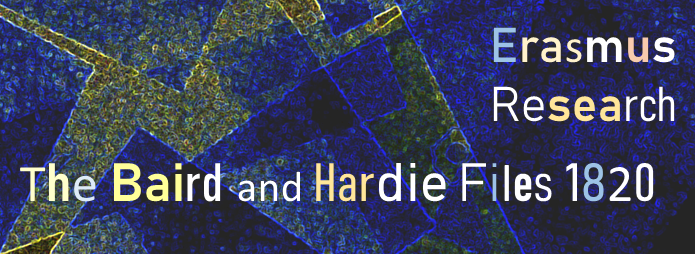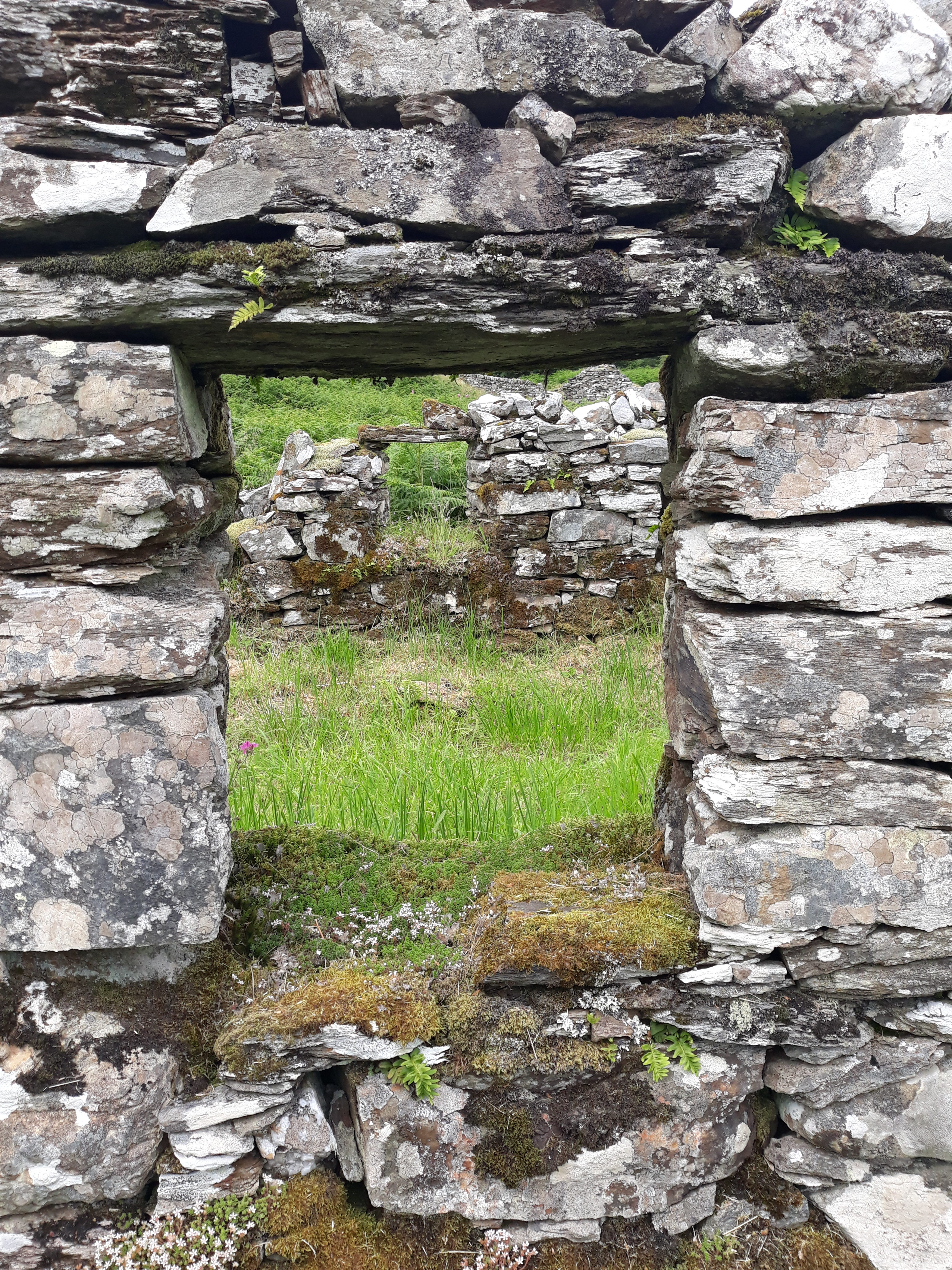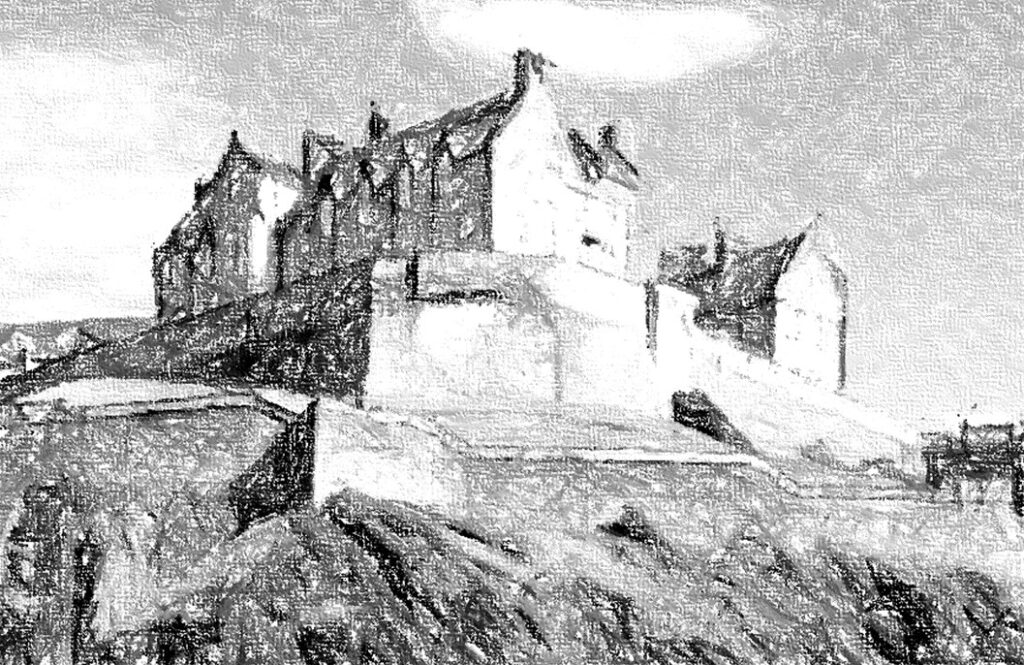
This is the second section of Chapter VII of the serialisation, the wording reproduced exactly as it appeared in the Stirling Sentinel, on Tuesday 26th March 1889.
Baird and Hardie, with the other prisoners, were removed from Stirling to Edinburgh Castle a day or two after their apprehension, for the convenience of the Crown lawyers, who now applied themselves to the getting up of a case of high treason against the unfortunate Radicals. Hardie, who seems to have been a very intelligent man, and able to express his thoughts in a style surprisingly good for an artisan, wrote a series of letters to his relations from Edinburgh Castle. His first letter, addressed to his mother was intercepted by the authorities, and never reached his friends. His second letter was as follows:-
Edinburgh Castle, 22nd April, 1820
Dear Mother, Sister, and Brothers,
This is the second letter I have written to you; to the first, dated 9th instant, I received no answer, which surprises me much, for I expected an answer by the first post. I received a parcel containing some articles, all of which I stood in great need of. I informed you in my first letter how we were situated, and how we had been deluded away. We are now in the Castle and are used by the utmost civility, far beyond my expectation. I have a Bible, which I use with attention, a good and fire, with an allowance of a shilling a day to keep me; and for these favours I give the authorities of Edinburgh my sincere thanks. I wrote to you for a little money, which I knew you could ill spare, but you need not send any, for the allowance I have is quite sufficient. I have plenty of time to reflect upon my past conduct, which I hope will be forgiven me, through the merits of our blessed Saviour, who suffered death that our sins might be forgiven us. I know that you will be concerned about my unfortunate situation; as I observed in my first letter, but I hope god will strengthen your heart to bear with patience whatever is His holy will; as for me, I am bearing it with great fortitude. I sent my compliments in my first letter to Margaret McKeigh and Mrs Cornwell, which I hope you have delivered; you will be so kind to do the same again, and tell Margaret to give my best respects to her brother and sister. My dear friends, I hope you will not delay writing to me, as soon as this comes to hand; I have been in great anxiety, day after day, to hear from you; I expected to have got a few lines in the bundle you sent me, but to my great disappointment there was none. Give my kind compliments to my shopmates; I know they will miss me – I hope they will take care of my poor bird, which you may allow to remain with them, if you please. I hope you have got a journeyman to my web. Give my kind compliments to all my acquaintances, and my comrade, Walter. I heard there was a man from Glasgow in Stirling, who was inquiring for me – I suppose it was him. Let me know if he had an interview with Jean McKechnie. I saw her at the door as we passed through Queen Street, Stirling, on our way to the streamboat. Give also my kind compliments to all my relations, and let them know that I am in good health, for which I thank God. I again entreat you to write immediately. May God bless you is the sincerest wish of,
Your unfortunate son and brother,
ANDREW HARDIE
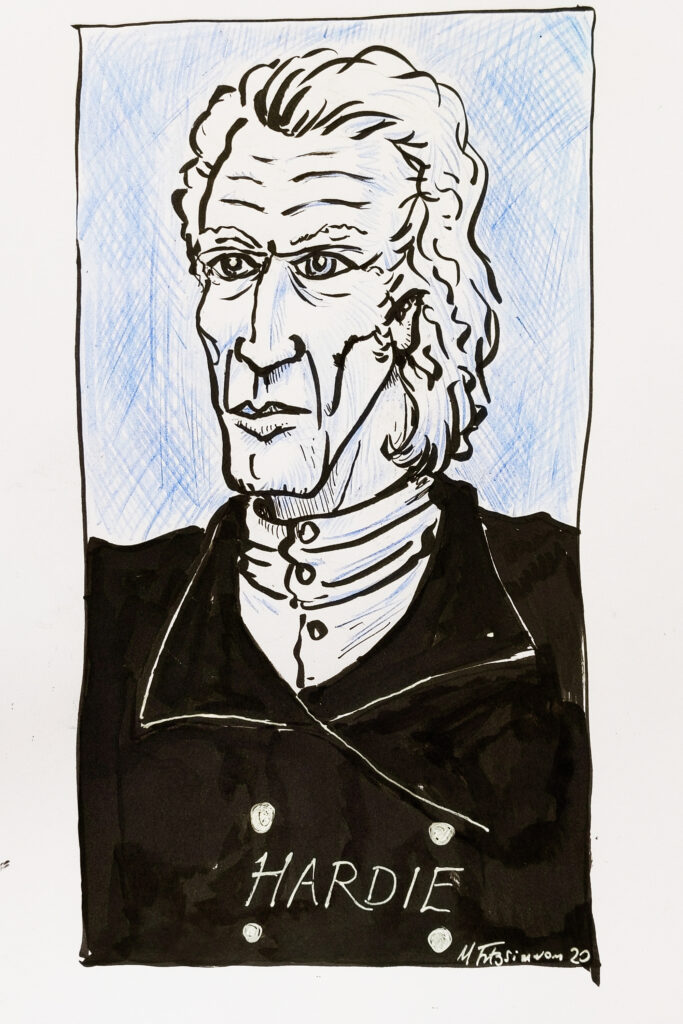
My unfortunate companions, Park, White, Johnston, and Thompson, are also in good health, as far as I know, we being in separate apartments; all the others are strangers to me. A.H.
Direct to me,
Prisoner, Edinburgh Castle, to the care of Mr Sibbald, New Jail, Edinburgh.
Hardie’s cousin John replied to this letter, and on the back of the reply, Hardie penned the following lines:-
“In these sad moments of severe distress,
When sorrows threaten, and when dangers press,
For my defence behold what arms are given,
Firmness of soul, and confidence in Heaven.”
Writing again on the 5th May, Hardie assures his cousin that the latter was perfectly right in his conjecture with regard to his (Hardie’s) wishing that he had been killed; he really did wish so. “When I got to Stirling,” (he continues) “and took into consideration what a rash, and foolish, and unlawful action I had been guilty of, I wished I had been shot; but I sincerely repent of that rash wish and hope it will be forgiven me, and I thanked my God that he did not hurry me into his presence in such an unprepared state.“ He also recalls the fact that the 5th of May was his birthday, and says he little expected to pass it as a prisoner in Edinburgh Castle or anywhere else. He was only 27 years of age, poor fellow.! His next letter is dated May 16, and in it he counsels his brothers and sister to be kind to his afflicted mother, as he knew this melancholy affair would sink deep in her tender heart. He likewise asks them to take warning from his misfortune. On June 6, he writes to his mother a long and affectionate letter, and on June 10, he informs his relatives that his trial is to take place at Stirling on the 23rd, and hopes they will make no delay in getting testimonials of his character. He would be very happy if any of them could come to Edinburgh to see him, but he hears that no permission will be granted for a visit to him. On receiving this letter, Hardie’s relative applied to the Hon. Admiral Fleming, of Cumbernauld, and Mr Graham, of Whitehill, two well-known Whigs, to use their influence to obtain permission for an interview with the prisoner, and both these gentlemen kindly interested themselves in the matter. Admiral Fleming wrote to Sir Michael Shaw Stewart, and Mr Graham wrote to his son, an Edinburgh advocate, and application was made to the Crown lawyers, but without success. No indulgences would be shown to political prisoners at that time.

Baird wrote three letters to his brother while he was confined in Edinburgh Castle. In one of these, dated 1st June, he says:- “I am come to this of it now, when courage must face danger – conscience support pain – patience possess itself in the midst of discouragements.” Brave and manly words, John Baird! They have the true martyr ring in them.
For the trial of the Radicals the Government appointed a Special Commission of Oyer and Terminer, consisting of Lord-President Hope, Lord-Justice Clerk Boyle, Sir Samuel Shepherd, Chief Baron of the Court of Exchequer; the Right Ho. W. Adam, Chief Commissioner of the Jury Court in Civil Cases; Lord Herman and Lord Gillies, who were empowered to hold sessions in the counties of Stirling, Lanark, Dumbarton, Renfrew, and Ayr, beginning at Stirling on the 23rd June. On the 21st, the State prisoners from Edinburgh Castle, under the guard of Captain Sibbald, arrived at Stirling by steamboat, to await the ensuing trials, being attended on board by a party of military, while a strong company awaited them on their arrival. They were confined in the cells of Stirling Castle. On the following day the Lords of the Commission arrived by road. Their Lordships were received at St Ninians by Provost Buchan and the Magistrates (Baillies Young, Paterson, Aikman and Balfour) and escorted to the Lion Inn (now the Golden Lion Hotel) by a company of the 33rd Regiment, under the command of Colonel Elphinston, and by a detachment of the Glasgow Yeomanry Cavalry, commanded by Captain Charles Stirling. At the inn, they were waited upon by General Graham, Deputy-Governor of the Castle, and other gentlemen of the town. There was a great influx of visitors to witness he trials, and accommodation for man and horse was difficult to obtain.
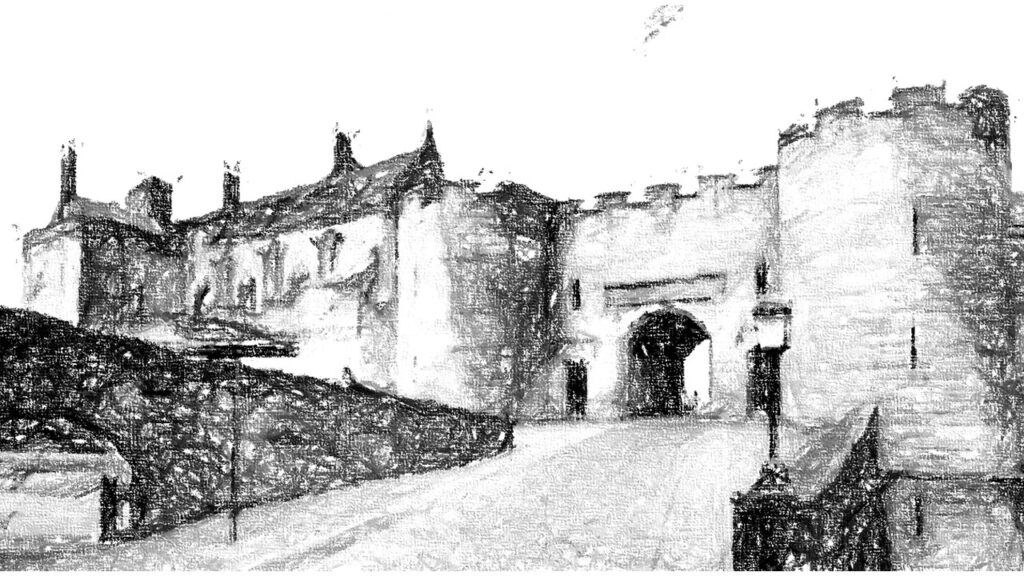
On Friday, 23rd June, the Commissioners sat in the Court House, Broad Street, and after prayer by the Rev. Dr Wright, of the first charge, the order made proclamation and opened the court. Mr T.G. Knapp, as Clerk to the Commission, informed the Lord Commissioners that there were two Commissions, one in Latin, and one in English; they were both laid on the table, and their Lordships decided that the English Commission should be read. The Sheriff delivered his returns, consisting of a calendar of all the prisoners, a list of the Magistrates of Stirlingshire, and a list of the Grand Jury, all on parchment, with a return that there were no high constables in the county. The Clerk then called over the names of the Justices, and marked those who appeared and answered to their names. The Crier then made proclamation for the attendance of the Grand Jury, the Clerk called over their names, twenty-two in number as follows:- The Honourable George Abercromby (foreman), Sir Thomas Livingston, Bart., Sir James Liddell, Bart., Peter Spiers, Esq., William Morehead, Esq., Ninian Lewis, Esq., Samuel Cooper, Esq., James Bruce, Esq., George Callander, Esq., Francis Simpson, Esq., Alexander Gartshore, Stirling, Esq., John Henderson, doctor of physic; John Baird, Esq., John Kincaid, Esq., William Archibald Cadell, Esq., Patrick Muschet, doctor of physic; John Murray, Esq., James Russell, Esq., Duncan Robertson, Esq., Joseph Stainton, Esq., Thomas Campbell Haggart, Esq., Alexander Ramsey, Esq. It was a curious coincidence that there were on this Grand Jury a John Bird, and among the witnesses later examined both a Baird and Haride. The clerk administered the oath first to the foreman, and subsequently o the remaining members, four at a time. The Crier made proclamation for silence whilst His Majesty’s proclamation should be read, and the Clerk then read the proclamation against vice, profaneness, and immorality. The Crier then made proclamation for silence, whilst the charge was delivered to the Grand Jury.
(to be continued)
The next instalment of the serialisation will be published here on the 3rd November 2020.




